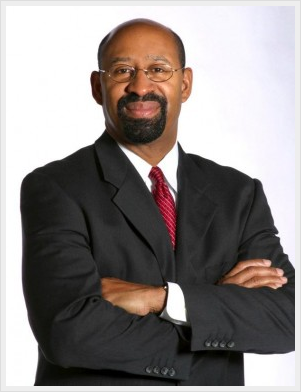
World Business Council unveils report on Philadelphia
22 November 2013
by Richard Forster
At the Greenbuild International Conference yesterday, Matthew Lynch from the World Business Council for Sustainable Development (WBCSD) presented a report to Michael Nutter, Mayor of Philadelphia, setting out sustainability initiatives to support Philadelphia’s goal of becoming the ‘Greenest City in America’.
“Becoming the first American city to work with the Urban Infrastructure Initiative (UII) shows that Philadelphia is open to new ideas,” said Mayor Nutter after receiving the report from Matthew Lynch, who is Project Director for the UII programme. “By participating, we hoped to receive valuable, practical insights from some of the world’s leading companies. The report outlines specific recommendations and solutions that are applicable here in Philadelphia but will likely also be of interest to many other city leaders in North America.”
Philadelphia is the first city in North America to participate in the UII, which is a unique project established by the WBCSD, to show the critical role that business can play in identifying solutions to complex urban sustainability challenges. The UII’s 48-page report for Philadelphia was produced by a group of seven leading companies who worked collaboratively throughout 2012 with city officials, as part of a wider programme that involves producing similar reports for 10 cities around the world.
Consultations for UII’s Philadelphia report involved a team of multi-disciplinary company experts from: AECOM; Schneider-Electric; Siemens; TNT; Toyota; UPS; and UTC, and city officials led by Katherine Gajewski, Director of the Mayor’s Office of Sustainability.
“This engagement is a tangible example of how cities can work with business at a strategic level to help realise their visions, while unlocking the innovation capacity of the private sector to develop practical solutions,” said WBCSD’s Matthew Lynch.
The UII report for Philadelphia focuses on integrated solutions to meet the challenges of urban sustainability in key areas such as energy, water and mobility, and examines the specific issue of the efficiency and environmental performance of the city’s fleet of over 6,000 vehicles.
“Working with the UII team, we were able to take advantage of outside expertise and perspectives in some of the areas where we thought we could most benefit,” said Katherine Gajewski. “The recommendations made are already contributing to our thinking on a next generation municipal fleet and asset management. The experience made it clear that there is significant alignment between the sustainability goals that government and the private sector have, and that both sides can benefit from enhanced collaboration.”











